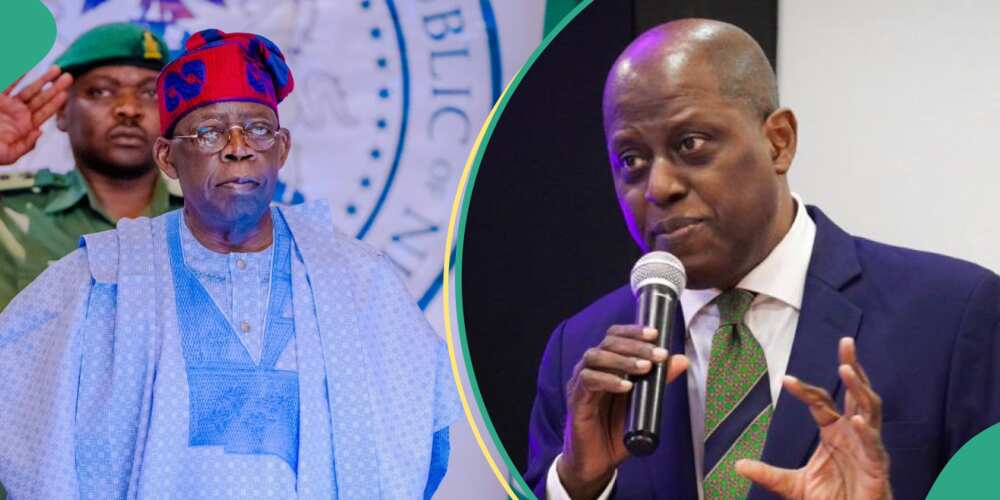In a dramatic turn of events, President Bola Tinubu has reportedly ordered Olayemi Cardoso, Governor of the Central Bank of Nigeria (CBN), to resign due to his inability to stabilize the country’s struggling economy, particularly the rapid devaluation of the Naira.
Sources close to the presidency revealed that Tinubu delivered the ultimatum just before his departure for China, despite efforts by Yoruba elders to shield Cardoso from dismissal.
Cardoso’s tenure, which began in September 2023, has been marred by a historic decline in the value of the Naira. At the time of his appointment, the exchange rate stood at N950/$1.
However, within a week, it slipped further, reaching N970/$1 and continuing its downward trajectory. By September 2024, the Naira had plummeted to N1,645/$1, representing a 117% depreciation in less than a year.
Cardoso’s downfall is reportedly tied to a promise he made to President Tinubu in January 2024, pledging to restore the Naira to a more stable rate of N700-N900 to the U.S. dollar by May 29, 2024.
READ ALSO: CBN requires all PoS transactions to go through licensed aggregators
When this target was missed, the president grew increasingly frustrated, waiting through the summer months for a turnaround that never materialized. Sources say Tinubu’s patience ran out in August, when he demanded Cardoso’s resignation.
A source inside the presidency explained, “The president is frustrated with Cardoso’s inability to deliver on his promises. He expected significant progress in stabilizing the Naira and is now facing criticism for the CBN’s poor performance under Cardoso.”
Before his departure for China, Tinubu met with Yoruba elders who reportedly lobbied on Cardoso’s behalf. The group, including high-profile figures like Prince Dipo Eludoyin, APC chieftain Bisi Akande, and NNPC chairman Pius Akinyelure, pleaded with the president to reconsider his decision.
However, Tinubu was said to be resolute, rebuffing their efforts and insisting that Cardoso must resign.
During the meeting, Tinubu allegedly expressed his frustration with the current state of the economy and the ridicule he has faced over the worsening currency crisis. “I asked you to bring your resignation letter, not to beg,” Tinubu reportedly told Cardoso, referencing the governor’s unmet pledge to stabilize the exchange rate.
READ ALSO: CBN mandates proof of investment for foreign capital repatriation, divestment
Cardoso’s tenure has also been marked by allegations of lavish spending and mismanagement within the CBN. Insiders claim that Cardoso and his deputies expended significant amounts on luxury SUVs, accommodations, and other expenditures while the country’s economy continued to falter.
Additionally, the CBN has yet to release its audited accounts for 2023, raising further concerns about the transparency and accountability of the institution.
These issues, combined with the continued crash of the Naira, have added to the mounting pressure on Cardoso. Critics have drawn comparisons between his tenure and that of the embattled former CBN governor, Godwin Emefiele, whose administration was plagued by allegations of financial mismanagement.
President Tinubu’s growing discontent with Cardoso’s performance reflects broader frustrations with his economic team, as the country continues to grapple with inflation, unemployment, and a weak currency. Insiders suggest that the president is now considering bringing in new leadership to the CBN, hoping for fresh ideas to stabilize the economy.
If Cardoso is forced to step down, he will go down in history as one of the shortest-serving CBN governors. His exit would also raise questions about the ability of the current administration to manage Nigeria’s ongoing economic crisis, as the country searches for solutions to its fiscal and monetary challenges.
As the situation unfolds, it remains to be seen whether Cardoso will voluntarily step aside or face an official dismissal.
Regardless, his tenure at the helm of the CBN has exposed deep-rooted issues in Nigeria’s financial sector, with both economic mismanagement and the currency freefall eroding confidence in the country’s monetary policy.
The president’s decision to demand Cardoso’s resignation marks a pivotal moment for the future of Nigeria’s economy and the leadership of its central bank.

 Entertainment1 week ago
Entertainment1 week ago
 Business1 week ago
Business1 week ago
 Health1 week ago
Health1 week ago
 Business1 week ago
Business1 week ago
 Latest1 week ago
Latest1 week ago
 Entertainment1 week ago
Entertainment1 week ago
 Football1 week ago
Football1 week ago
 Entertainment6 days ago
Entertainment6 days ago

